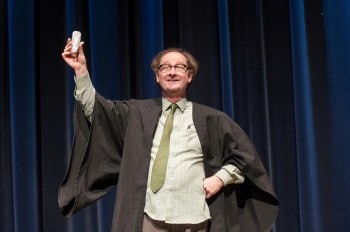John Doyle’s Vere (Faith) by The State Theatre Company of South Australia

John Doyle knows his target audience very well indeed (he’s one of them) and hits a bull’s-eye with his new play Vere (Faith).
Ground-breaking sociologist Max Weber defines the upper middle class as “well-educated professionals with graduate degrees and comfortable incomes.” Any premier Arts centre will always be packed with that demographic on opening night and the Dunstan Playhouse of the Adelaide Festival Centre is certainly no different.
Doyle had South Australia’s upper middle class swooning with laughter throughout the entire 2 hours and 20 minutes of Vere.
Vere (Faith) tells the story of Vere, a popular and successful head of a Department of Physics at an Australian University. The play is given two distinct parts with the first half set at a university, initially using the audience as the students at a lecture before segueing into the Physics department office. Vere is about to leave for a new job at CERN in Switzerland to try to discover the Higgs boson particle (the god particle). Vere is also informed he has been diagnosed as having dementia with Lewy Bodies. An office get-together ensues with the Vice Chancellor, Vere’s colleagues and a student. (While Doyle’s Higgs boson premise is now clearly dated, it doesn’t matter as this show could be set during ‘The Manhattan Project’ period and it would still work.)
The second half, with the same actors playing different roles with similar names, is set in the apartment of Vere’s son and daughter-in-law. The premise is a dinner for the imminent marriage of Vere’s grandson. The grandson and his bride-to-be arrive with the in-laws following soon after. Ostensibly at least, the elephant in the room is Vere and the symptoms of his now advanced dementia.
Pip Runciman’s set is good but oddly out-of-sync with the script. The first half is an academic’s office. The problem is it seems to be an office from the 1970s rather than that of a contemporary University. In the second half the ‘apartment’ has four doors on either side of the stage with a plain wooden dining room table and chairs centre stage and a black ‘window’ at the rear of the stage but it looks more like a University hallway with a table plonked in the middle, again from the 1970s.
[pull_left]Doyle is a qualified secondary school teacher writing about the upper echelons of academia – Hyacinth Bucket would have enjoyed opening night in the Dunstan Playhouse.[/pull_left]
Sarah Goodes direction is generally excellent but there are problems with blocking in the second half, although the set is certainly no help.
Matthew Gregan and Melody Bailey both perform well in minor roles, with Gregan the stronger of the two.
Rebecca Massey as Kate/Katherine is a bundle of hard-nosed energy; her performance in both roles is quite perfect.
Yalin Ozucelik as Simon/Scott delivers a naturalistic style with professional ease, as does Ksenja Logos in the roles of Marissa/Melissa.
Paul Blackwell does everything required of him in the role of Vere and he does it with an endearing touch of humanism. He plays the clichéd role of a slightly wacky professor with a heart of gold exceptionally well and his Albert Einstein-ish hair only adds to a thoroughly enjoyable performance.
Geoff Morrell in the roles of Vice Chancellor Ralph and the Reverend Roger steals the show with a performance that sparkles and captivates. Morrell is more than simply a joy to watch, he is an active miracle within the confines of this play.
Doyle gives his audience what they want and they clearly enjoy it. There’s lots of amusing academic-style waffle and sight gags, even smell gags. It’s exceedingly juvenile humour but it works. The problem is in an overall sense. Vere lacks the air of verisimilitude, which is surprising considering the show’s pedigree; Doyle’s own background, his long-standing social status in Australia and his public statement about “caring for my Father while dementia consumed him.”
Doyle writes out some expectant conflicts between religion, science and philosophy but it reads like a 3rd year student paper; lots of paraphrasing without a break-through. His characterisations too often come across as gross caricature. The audience is left with a final denouement on the human imagination but it’s pretty mild stuff. It’s a show you can laugh along with but it doesn’t inspire a lot of reflection. As Art, it’s colour without depth. Doyle is a qualified secondary school teacher writing about the upper echelons of academia – Hyacinth Bucket would have enjoyed opening night in the Dunstan Playhouse.
